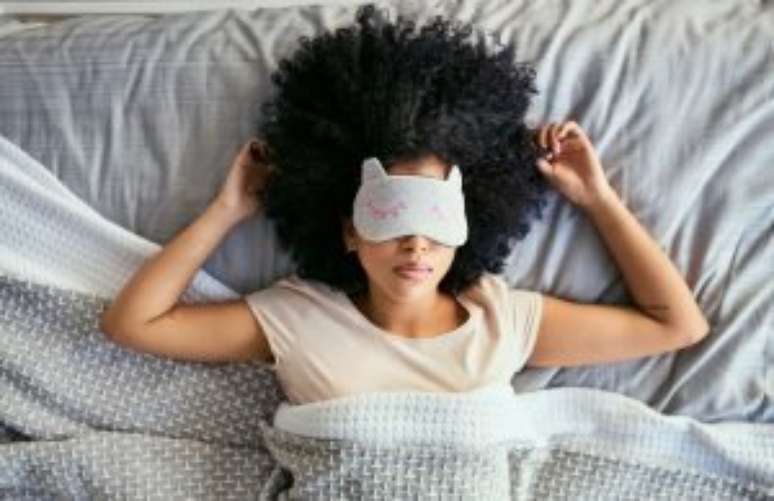Did you know that healthy sleep is important for your physical and mental health, as well as good cognitive performance?
According to the Associação Brasileira do Sono, at least 1 in 3 Brazilians suffer from insomnia. The worldwide prevalence of insomnia symptoms is approximately 30-35%. Symptoms such as fatigue, concentration or memory difficulties, impaired work or study, mood swings/irritability, daytime sleepiness, irritability, loss of motivation may be symptoms related to this disease.
html[data-range=”xlarge”] figure figure img.img-4b6cb7c6ee53a3db3a4b6983d263a6afrc3r9ztu { width: 774px; height: 501px; }HTML[data-range=”large”] figure image img.img-4b6cb7c6ee53a3db3a4b6983d263a6afrc3r9ztu { width: 548px; height: 354px; }HTML[data-range=”small”] figure image img.img-4b6cb7c6ee53a3db3a4b6983d263a6afrc3r9ztu, html[data-range=”medium”] figure image img.img-4b6cb7c6ee53a3db3a4b6983d263a6afrc3r9ztu { width: 564px; height: 365px; }
Shot of a young woman sleeping with a mask in bed What is Insomnia? Insomnia is a sleep disorder characterized by persistent difficulty initiating, maintaining, and consolidating sleep, occurring despite adequate opportunity to fall asleep, and resulting in daytime disturbances. It happens at least 3 times a week in 3 months. The amount of time needed for restful sleep varies from person to person. Most people need seven to eight hours of sleep a night. Stress, anxiety, worries, lack of sleep routines are frequent causes of insomnia. Other frequent causes of insomnia are chronic pain, medications, respiratory and rheumatological diseases, depression, hormonal changes and aging. With today’s fast-paced life, voluntary sleep deprivation is very common, even if unintentional. Whether it’s for work, the use of social networks and electronic devices in general, staying up late watching a series on Netflix. What causes insufficient sleep syndrome. And did you know that insomnia can be treated? The first step is changing sleep habits and hygiene. See tips for good sleep: Adopt regular sleep schedules: A sleep routine is very important, going to bed and getting up at around the same time educates your body, this is called the biological clock. Avoid sleeping a lot during the day: naps longer than 30 minutes (at any time of day) tend to compromise night sleep. Avoid caffeine at night: caffeine lasts 8-9 hours in the blood, try to avoid it after 2 or 3 pm. Avoid coffee, black tea, mate tea, soda and energy drinks. Avoid alcoholic beverages: Although the first effect of alcohol is sedative, it can cause agitation after a while. Avoid alcohol consumption three hours before bedtime and as a sleep inducer. Regular physical activity: Physical activity is essential for good health and helps you sleep better. Pay attention to nocturnal physical activity, see if it no longer causes agitation. The ideal is physical activity in the morning or in the afternoon. Create a cozy place to sleep: An environment with little or no light and quiet is ideal for sleeping. Avoid the lights, dim them, and if you can’t reduce ambient noise, use earplugs. Create a sleep ritual: hot bath, relaxation techniques, light reading, calm music, meditation, create your own ritual. Drink calming teas such as passion fruit, lemon balm or chamomile or even warm milk. Decrease exposure to night light: Strong lamps, computer screens, tablets and cell phones can disrupt melatonin production and thus disrupt sleep. Stay away from electronics for at least two hours before going to bed. Do not self-medicate: Insomnia drugs have specific indications and if used improperly can cause addiction or even worsen the quality of sleep in the long term. Don’t fight insomnia: going to bed without sleep won’t help. Laying in bed without sleep can make anxiety and restlessness worse. Get up and do a relaxing activity. If you suffer from insomnia, even with the suggestions provided here, ask your doctor for help. Good sleep is a sign of good health and a better quality of life.
Source: Terra
Ben Stock is a lifestyle journalist and author at Gossipify. He writes about topics such as health, wellness, travel, food and home decor. He provides practical advice and inspiration to improve well-being, keeps readers up to date with latest lifestyle news and trends, known for his engaging writing style, in-depth analysis and unique perspectives.








